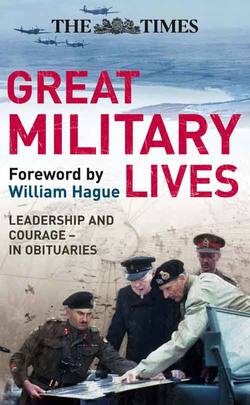Читать книгу The Times Great Military Lives: Leadership and Courage – from Waterloo to the Falklands in Obituaries - Ian Brunskill - Страница 4
FOREWORD WILLIAM HAGUE
ОглавлениеPoliticians should always be very careful when commenting on military matters. My own hero, William Pitt the Younger, was right to say that ‘I distrust extremely any ideas of my own on military subjects’, despite the fact that he was the longest serving war leader in the modern history of Britain. Even he, a statesman who built the great international coalitions against revolutionary France, found that as a man who had never seen a battlefield, his second-guessing of generals from Downing Street could lead to disaster.
This magnificent collection of obituaries of great military leaders from The Times offers plenty of reminders of just how tense the relations between generals and political leaders can be in wartime: Lord Alanbrooke, one of Britain’s best Second World War Generals, is quoted as saying of Winston Churchill, ‘He is quite the most difficult man to work with that I have ever struck, but I would not have missed the chance of working with him for anything on earth’.
Yet some of these impressive men of war went on to become the political leaders of their nations, from the Duke of Wellington and Ulysses S Grant, through to Paul von Hindenburg – his ‘iron mask and rock-firm figure became an inalienable possession of the nation’ – and Dwight D Eisenhower. Others used the immense stature gained from victory in war to intrude into politics whenever they fancied: I much enjoyed reading of Montgomery’s ‘trenchant contributions’ to debates in the House of Lords in his old age, ‘delivered from somewhere near the exact centre of the Conservative benches but often turning his own front bench colleagues pale with apprehension.’
For all of us who love reading history, these assessments of such pivotal figures are full of fascination, covering as they do the full sweep of military history over the last two hundred years. It is impossible to read them without reflecting on the inability of most of these extraordinary people to foretell even the immediate future. Admiral of the Fleet Lord Fisher is something of an exception with his prediction in 1910 that ‘war will come in 1914 and Jellicoe will command the Grand Fleet’, but it is more telling that Hindenburg initially retired in 1911 believing that he would never have the chance to serve in wartime and MacArthur confidently informed President Truman in 1950 that the Chinese were unlikely to intervene in Korea with any force. The sharp turns taken by history are often a shock to the most brilliant of minds.
These men’s minds were, however, well attuned to combining the pursuit of an overall strategy with the rapid taking of decisions under extreme pressure: abilities which distinguish the mind suited to executive command from one better devoted to campaigning or commentating. This above all is why we politicians must treat these figures with reverence, as a reading of the pages devoted to Britain’s military leaders in the First World War shows well. For there we find Allenby winning the war against Turkey over a vast area of the Middle East with a strategy of which ‘the original conception, the patience in preparation, the rapidity and audacity in execution, prove that [he] was a true master of war’.
There too is Admiral Beatty, boldly and suddenly taking his battle-cruisers into the Heligoland Bight to achieve victory when a more cautious leader would have held back, and then his colleague Jellicoe, whose command of the Fleet gave him, according to Churchill, responsibilities on a different scale from all others: ‘the only man on either side who could lose the War in an afternoon’. It is just as well, as his obituary writer notes with approval, that his life had moulded him specifically for such duty, particularly as ‘he did not know in earlier years the softening influences of money or friends in high places’.
Obituaries are necessarily history as it was seen and understood at certain moments, and are often kinder than the subsequent judgement of later decades, but they have the advantage of dealing with the whole life of an individual whom we are used to reading about only at the peak of their career. Many of us will have read of the brilliance of Marshal Zhukov as he led the Soviet armies in the destruction of the Third Reich; we may have overlooked the fact that both Stalin and Krushchev rubbished his achievements and that he had to wait until 1965 before he could appear in public at a military parade and receive a ‘special burst of applause’.
Whether hailed or derided by their contemporaries, these are the stories of great men. Many of them, of course, would have considered themselves such at the time. When Montgomery was asked to name the three greatest generals in history, he replied ‘the other two were Alexander the Great and Napoleon’. So as we enjoy their lives afresh, with all their fascination and inspiration, we can be sure they would have wanted and expected us to do so.
